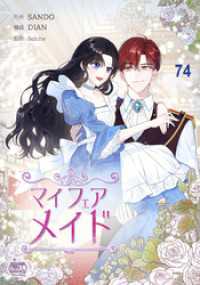- ホーム
- > 洋書
- > 英文書
- > Computer / General
Full Description
This book is an introduction to game studies, written in an approachable way that outlines useful perspectives that readers can use to interrogate games as a primary text. It provides the reader with a toolset that can "level up" their own critical perspectives.
This book is organized around several evaluative lenses, each supported with case studies. These lenses approach the analysis of games from different perspectives, outlining some of the important foundational work from game studies and other relevant disciplines, and then relating it widely across a corpus of modern titles. This book covers video games, role‑playing games, and board games, along with digressions into other more obscure areas such as LARPs, Mega‑Games, and Non‑Games. Each of the main areas calls back to how each of the evaluative lenses of this book could be used to illuminate intersections of medium and theoretical perspectives. The provided case studies then offer deeper dives into titles of particular significance.
This book will be suitable for students in games‑related courses at multiple levels of the curriculum, game critics, and those who simply want to develop more interesting and nuanced opinions on games.
Contents
1. An Introduction to Game Studies
Michael Heron
2. Critical Perspectives in Game Studies
Michael Heron
3. Secret Hitler: Political Symbolism and Metagaming in Social Deduction
Constantina Edesa‑Filios
4. Systemic Perspectives in Game Studies
Michael Heron
5. Box Classification and Puzzle Logic in the Video Game Wilmot's Warehouse: Its Relation to Language and Semantics Categorization and Language in Wilmot's Warehouse Gameplay
Nayat Astaiza‑Soriano and Eleni Gianntizi
6. Experiential Perspectives in Game Studies
Michael Heron
7. The Melancholy of Hollow Knight: A Study of the Dichotomy between Charm and Tragedy in the Artistic Elements of Hollow Knight
Klara Aune
8. Other Perspectives in Game Studies
Michael Heron
9. Animal Crossing: Turning a Space into a Place: A Reflection on the Psychogeography of Animal Crossing: New Horizons
Pauline Belford
10. Domain Knowledge in Tabletop Roleplaying Games
Michael Heron
11. The Tension of Blades in the Dark
Anna Brannen and Edvin Skog
12. Domain Knowledge in Video Games
Michael Heron
13. How Chants of Sennaar Creates Intriguing Gameplay around Learning Culturally Infused Languages
Luise Donat and Julius Lilie
14. Domain Knowledge in Board Games
Michael Heron and Pauline Belford
15. Conclusion
Michael Heron
-

- 電子書籍
- マイフェアメイド74
-

- 電子書籍
- 週刊 東京ウォーカー+ 2018年No…




